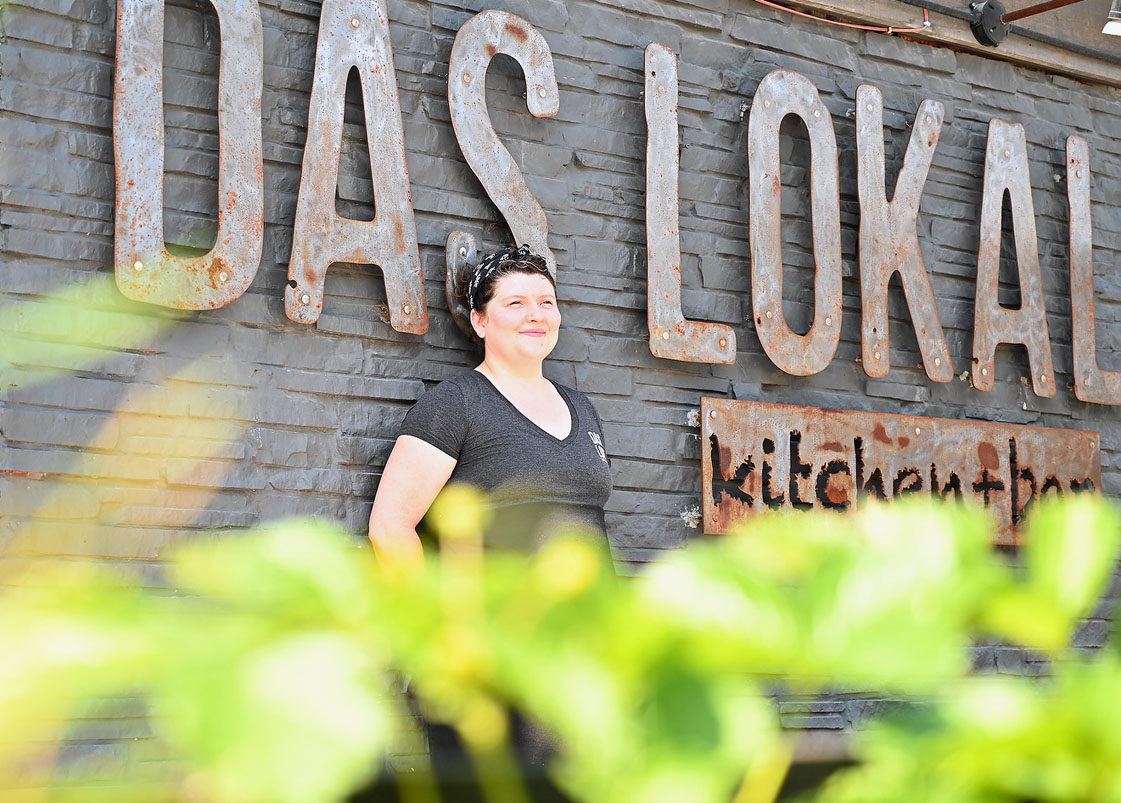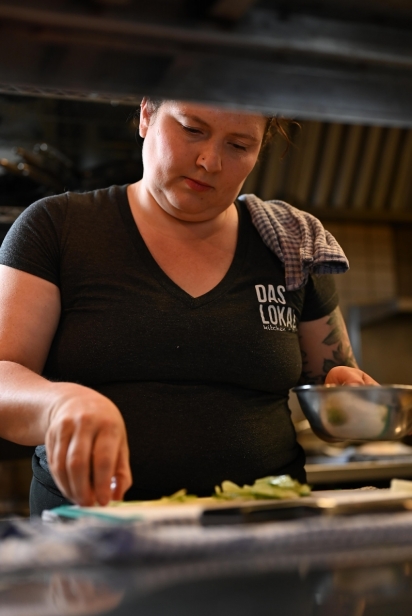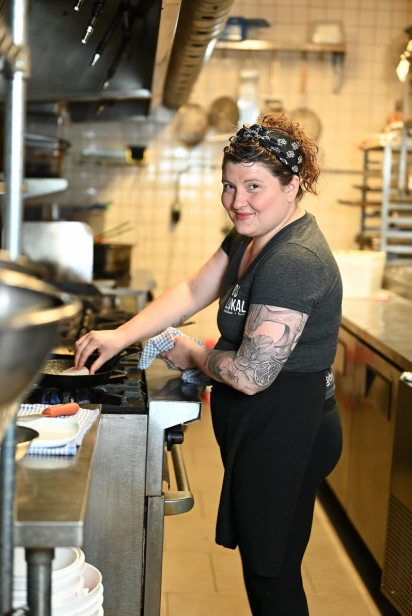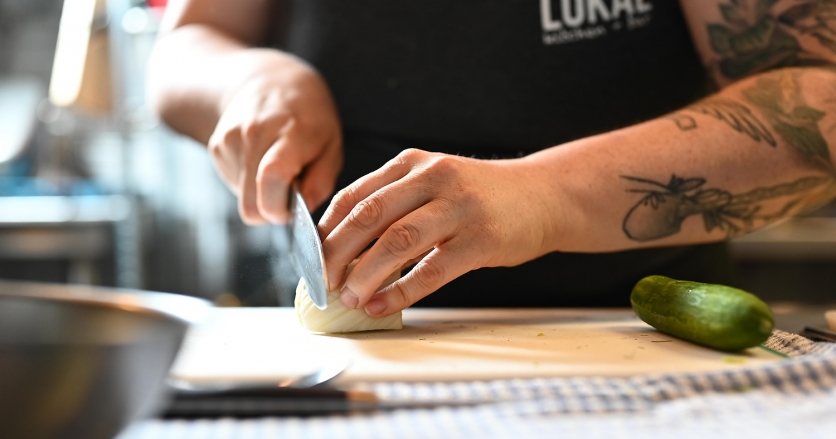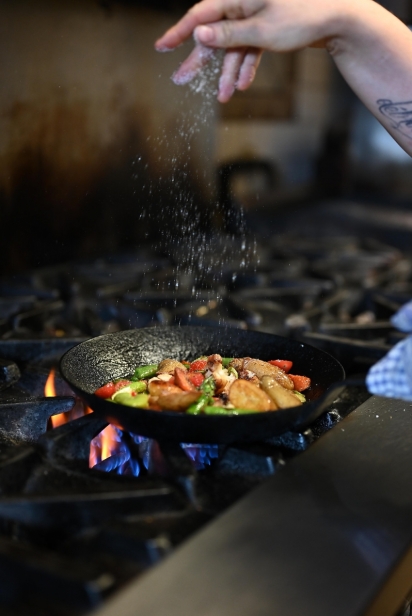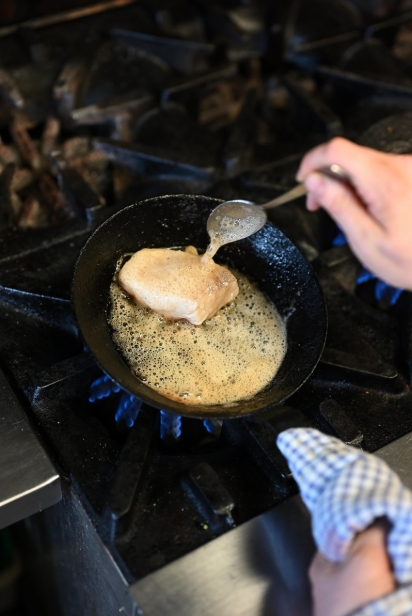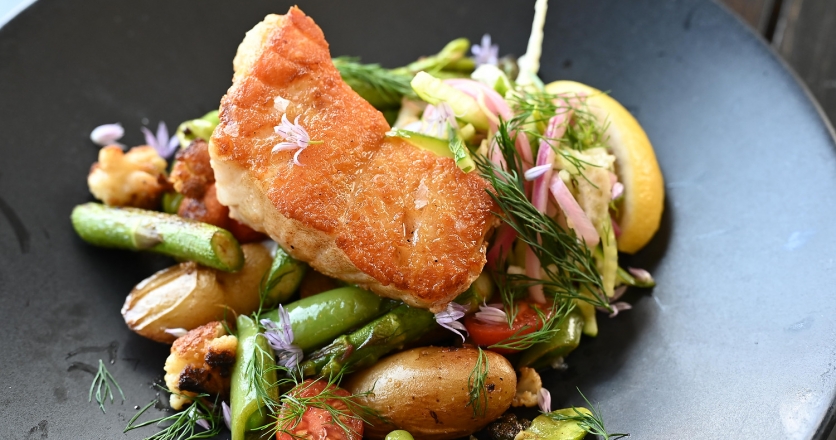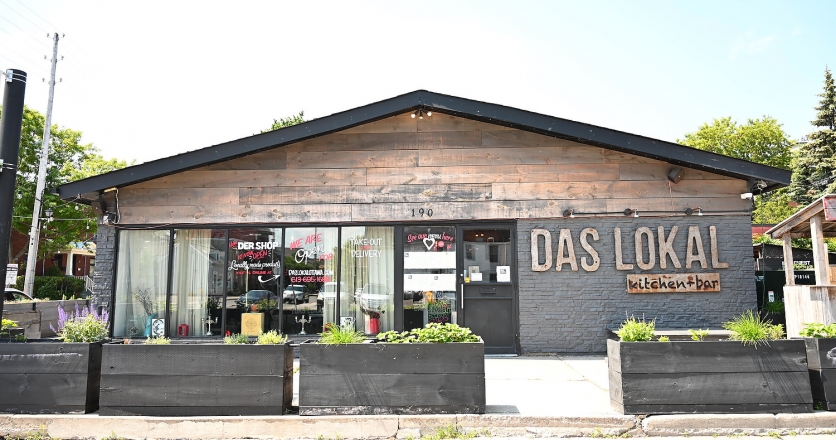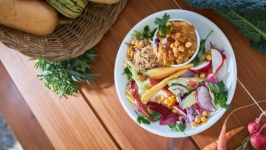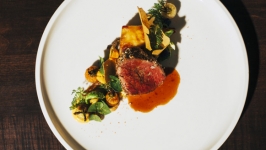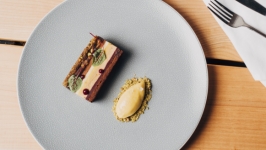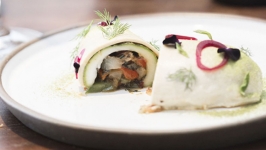A Veteran of the Pivot
Harriet Clunie has returned to her roots. The executive chef at Das Lokal Kitchen + Bar was also the German inspired restaurant’s opening chef back in 2013. During her second stint at the ByWard Market restaurant, she’s making some menu changes and moving away from the German focus, something the restaurant had been gradually doing for a few years anyway. Clunie is also making some profound changes in direction, including introducing a plant-forward menu, a trend many restaurateurs and culinary pundits talk about, but few dare to execute.
But Clunie has never been wedded to convention. A pioneer in Ottawa food service circles, she has worked front of house, back of house and has owned her own restaurant. And she’s been a constant advocate for food service workers’ rights, as well as their well-being, something she hopes to pick up as soon as COVID restrictions lift a little and get-togethers are allowed.
Clunie on a plate
Asked to present a dish from the Das Lokal menu that captures her culinary philosophy on a plate, Clunie presents a perfectly cooked piece of ling cod from Whalesbone, crisp and golden on the outside, moist and yielding inside, along with a pile of seasonal vegetables, including fresh local fiddleheads, hydroponic tomato, cucumber, fennel and beets, along with “a variety of herbage and lemon.” The herbage refers to a disc of herb and lemon butter that sits atop the food that comes as takeout in a compostable takeout container.
The dish does represent Clunie, but in the interview, she insists on “reframing” edible Ottawa’s request.
“I don’t consider anything at Das Lokal all me,” she says, with typical humility. “We’re very much a team. It’s definitely something I'm really conscious of, and I try to foster a collaborative approach to everything. So we sat down as a whole kitchen and went through the menu, and I took everybody's ideas. At the end of the day, I get a yea or nay, but we all sat down [to discuss it.]”
Clunie calls Das Lokal’s menu “Northern European-inspired” because she loves Scandinavian food, which is backed up by the fact that she’s also the chef for the Danish ambassador in Ottawa. But Das Lokal's menu is about to get another facelift.
“We’re making it officially flexitarian,” Clunie says. “We'll have a lot more veggie and vegan options. I've always been about making sure everybody can eat. I grew up with allergies, and my mom had bad anaphylactic allergies, so I've always been really sensitive to people with dietary restrictions. That’s been part of me as a chef, but I'm also very, very eco-conscious so I'm in the process of slowly greening the restaurant as much as I possibly can and part of that is meat consumption.”
Clunie, who claims her strangest personal allergy is to apples, plans to “flip the script” on Das Lokal’s menu. Whereas most restaurants make meat the central focus of the plate, Das will make vegetables the main attraction, sometimes with smaller amounts of meat, sometimes without any. “We'll still have meat for the people who eat meat and we’ll always have a fish dish and a charcuterie board. But we will also always have a vegan charcuterie board, a couple of vegan mains and always a vegan dessert.”
She admits she’s always been more interested in vegetables — their versatility, their colours, the way they pop in one’s mouth — than meat and Fredérique Tsai-Klassen, founder and an owner of the restaurant, is vegetarian so it fits with her ethos, too.
There are touches of Clunie throughout the restaurant, including the planters that surround the patio and serve as a garden for the surrounding community.
“Our garden is a community garden,” she says, and adds that one of her best friends is a gardener and takes care of the planters of everything from herbs and kale to raspberries. “What’s really cute is little kids who want to pick berries.” The servers give them a little cup to fill while they wait for their dinners.
Early influences and mentors
Clunie says her first food memories are of cooking with her mother, Kate Missen, who passed away in 2014. Because of her own allergies, and those of little Harriet, Missen was a scratch cook by necessity and liked to experiment with foods from all over the world.
“My parents were excellent cooks,” Clunie says. “I was the weird kid who had lamb curry in my Thermos in fourth grade and knew what a cardamom pod was. My mom was always on the forefront of what to eat, what we shouldn't eat and where we should be going environmentally. She was on about plastic before she died and that's only become mainstream now. She started buying organic food as soon as it was available. I draw a lot of inspiration from her and how she would approach recipes.”
Like her mom, Clunie is a voracious reader.
“I read a lot of non-fiction books about food, organic farming, food politics,” she says, naming Michael Schatzker as her favourite food author. “One of my favourite books about food is called The Dorito Effect. And it's about how when they process food. They add flavour to things that kind of tricks your brain and you don't get satiated in the same way, so you end up eating more.”
Clunie names chef Warren Sutherland as her biggest professional mentor. She first worked with him at Sweetgrass Aboriginal Bistro, an Aboriginal-Caribbean fusion restaurant he opened in the ByWard Market several years ago.
“He was probably the first chef who understood how my brain worked because he was an engineer so, like me, he needs to know why things work the way they do,” Clunie says. “Many chefs — I’d ask why they were doing something and the answer was always ‘because I said so.’ Warren would always answer my questions and explain why we did things certain ways.”
Clunie’s restaurant pedigree in Ottawa is long. In addition to Sweetgrass, she worked at Restaurant e18hteen, Oz Kafe, Back Lane Café, Murray Street Bistro, Navarra and at her own restaurant, Beechwood Gastropub, which she purchased as the chef from the previous owner in 2017.
“I like to call that my elite business school of one,” she says of owning her own business in her early 30s and closing it fewer than two years after she took over ownership due to chronic understaffing and burnout.
“I learned a lot,” she says. “I wouldn't trade it. I lost a lot of money, but that's okay. And I gained in knowledge what I lost in money. But it nearly killed me. In terms of burnout, I was just destroyed.”
After that, she started a small catering business, which she still loves doing, while also cooking for the Danish ambassador.
She continues to do both after being being wooed back to Das Lokal, first in a consulting role and now as executive chef, who is working on all aspects of the business.
Pandemic kitchen woes
In May of this year, Clunie admitted she had just taken six weeks off after again burning out from running a restaurant in COVID. She said it wasn’t the stress of closures per se, but rather the stress of rules changing every two to three weeks all year long.
“When [the government] announced something completely different, we’d have to figure it out all over again,” she says. “I’m pretty good in a crisis, but with this, I couldn’t control it. I had to have Plans A, B and C. Eventually, I took a few weeks off for self care. I take that very seriously. I knew I wasn’t doing well; I was struggling to get through the day. I was fighting to put the groceries away.”
Clunie doesn’t just advocate for her own mental health. Pre- pandemic, she had a plan in place to start a mental health group that would give restaurant industry workers “a safe place to talk about shit.” She has another friend who owns a gallery and studio and is planning to host a once-a-month alcohol-free event for food industry folks. She’s candid about her own relationship with alcohol in an industry where late-night after-service drinking is a release from all the stress involved in the job.
She noted that there are plenty of reasons a food service worker might not drink — it might be a trigger, they might not be able to stop, they might be Muslim or maybe they’re pregnant.
“At Das [Lokal,] I made it a big priority,” she says. “There’s a mocktail version of every cocktail, we have non-alcoholic beer, de-alcoholized wine. I have lots of friends who don’t drink. It’s becoming way more normalized. It gives me hope, but we have to actively do it. Having kombucha on tap is nice, or giving people the feeling of the bottle in their hand helps.”
As a woman who’s worked in the industry a long time, Clunie has seen her share of sexism and also racism inflicted on herself and colleagues. The pandemic has put a damper on her activism, but it may also offer an opportunity.
“I try my very best to be inclusive [at Das Lokal],” she says. “I really want us to have the future we’ve been imagining forever and we've kind of been given a blank slate [with COVID.] And so many things have been brought to light with the general public, even just Uber Eats fees. I'm almost now surprised when people don't know that they charge [upwards of] 30 per cent, but now they do know so I feel like there's a huge shift in how people view a restaurant.”
At Das Lokal, she changed the tipping system.
“I really gave this one a lot of thought — I’ve worked front of house and back of house,” she says. “I don’t think eliminating tipping is the way to go.”
Instead, she instituted a system in which servers get paid full minimum wage — usually they get less, but leave with the bulk of the tips — and they share half their tips with kitchen staff.
“The kind of server who would be happy with that will be a career server,” Clunie says. “People who value their time being paid properly and see that it’s equitable.”
Clunie's next project
For her next passion project — after she gets the mental health group and alcohol-free nights off the ground, post-pandemic — Clunie wants to create a restaurant association for progressive restaurants.
“We’ve all been doing this in our own silos,” she says, naming sustainability as one siloed issue. “There’s enough of us with the same point of view — sustainable, equitable, ethical in our practices — [that we should be able to] come together and face some of these challenges as a group using our lobbying and purchasing power.”
She spent a lot of time researching compostable and biodegradable packaging and Das Lokal spends a lot of money on it, but her thinking is that if she bands together with other restaurants, she could buy pallets’ worth and save money for everyone.
As she works on this kind of initiative, she’ll also continue to work as executive chef at Das Lokal, serve as chef for the Danish ambassador and run her small catering business known as The Wandering Chef.
“I like being part of being part of people’s meals, being able to explain the food, guide them through trying something,” she says.
Das Lokal Kitchen + Bar
190 Dalhousie St., Ottawa, Ont.
daslokalottawa.com | 613.695.1688 | @daslokalkitchenbar


